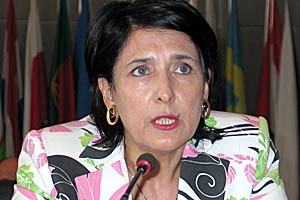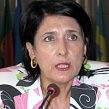
NEW GROUP OF GEORGIA’S FRIENDS FOUNDED
Publication: Eurasia Daily Monitor Volume: 2 Issue: 26
By:

Estonia, Latvia, Lithuania, Poland, Romania, and Bulgaria founded the “New Group of Georgia’s Friends” on February 4 in Tbilisi. The specification “new” differentiates it from the decade-old “Group of Friends of Georgia,” originally comprised of the United States, Germany, Britain, and France. That old group became collectively dysfunctional some years ago when it was renamed the “UN Secretary-General’s Group of Friends of Georgia” and allowed Russia to join as a veto-wielding member. That group also has inevitably been affected by the drift toward a Russia-First approach in Berlin and Paris.
The New Group does not in any way intend to supersede the old one. It is, rather, a different group with its own distinct mission, answering to requirements that could hardly have been anticipated when the old group took shape. The New Friends propose to share with Georgia their experience as formerly Communist-ruled countries that have completed or are set to complete their Euro-Atlantic integration processes, and now intend to promote such processes in the Black Sea-South Caucasus region.
Georgian Minister of Foreign Affairs Salome Zourabichvili chaired the New Friends’ founding meeting in Tbilisi, with her Estonian counterpart Kristiina Ojuland attending, along with State Secretaries for Foreign Affairs from the other five New Friends countries. The group is open to new member-countries from among new members of NATO and the European Union, and it hopes to bring in Azerbaijan and Armenia into the group in the next stage.
The New Friends intend to assist Georgia’s internal reforms and its efforts to qualify for eventually joining NATO and the EU, as well as to support international steps to provide security for Georgia. According to press releases from the Lithuanian and Georgian Ministries of Foreign Affairs, and informal statements to journalists in Tbilisi after the meeting, the New Friends’ goals include:
— assisting in the implementation of the Georgia-NATO Individual Partnership Action Plan (IPAP), the success of which can lead to a Membership Action Plan (MAP, a goal implied but not stated on this occasion); working to support NATO’s open-door policy;
— working within the EU to initiate the drafting, in a timely manner, of an EU-Georgia Action Plan as part of the EU’s recently adopted European Neighborhood Policy (in which the South Caucasus is now included after having been omitted initially);
— providing the services of experts for drafting of Georgia’s European integration strategy and for administrative capacity-building in Georgia;
— jointly urging, within international organizations, the removal of Russian bases and troops from Georgia, in accordance with Russia’s 1999 Istanbul Commitments; elevating this issue on the EU’s policy agenda;
— supporting Georgian President Mikheil Saakashvili’s recently launched South Ossetia Peace Initiative (see EDM, January 27);
— calling attention to the importance of EU and NATO participation in international efforts to resolve conflicts in the region;
As an urgent political priority, the New Group of Friends is urging the EU to take over the Georgia Border Monitoring Mission, which the OSCE has (at Russia’s insistence) given up.
Several programs are under way or getting started on a national basis. Estonia (a European front runner in computerization of public services) plans to launch one of its “Tiger Leap” programs for the computerization of Georgia’s public services, as well as to open a military liaison office in Tbilisi (an Estonian defense adviser is already stationed there). A Lithuanian heads the EU’s rule-of-law advisory mission in Georgia; and a Latvian serves as NATO’s liaison officer for the South Caucasus, based in Tbilisi.
For effective implementation of direct assistance to Georgia from their small resources, the New Friends intend to coordinate efforts, avoid duplication, and provide lists of experts available to work with Georgia. The New Group of Friends plans to hold meetings several times a year. Romania has offered to host the next meeting and to invite some additional countries, in keeping with the goal of enlarging the Group’s format.
Two initiatives have converged into the founding of the New Group of Friends of Georgia. One initiative is Romania’s, launched by then-Minister of Foreign Affairs Mircea Geoana in 2003, and continued energetically by Romania’s new President Traian Basescu and new government, reaching out to Black Sea countries on the new border of the enlarged NATO. The other initiative, spearheaded by Lithuania, seeks to impart the Baltic states’ successful post-Soviet transition experience to Georgia and other Black Sea-South Caucasus countries. Saakashvili’s recent visit to the Baltic states occasioned preparatory discussions on a 3 +1 and a 3 + 3 framework (Baltic-Georgia, Baltic-South Caucasus).
(Georgian and Lithuanian press releases, BNS, ELTA, February 4, 5).




